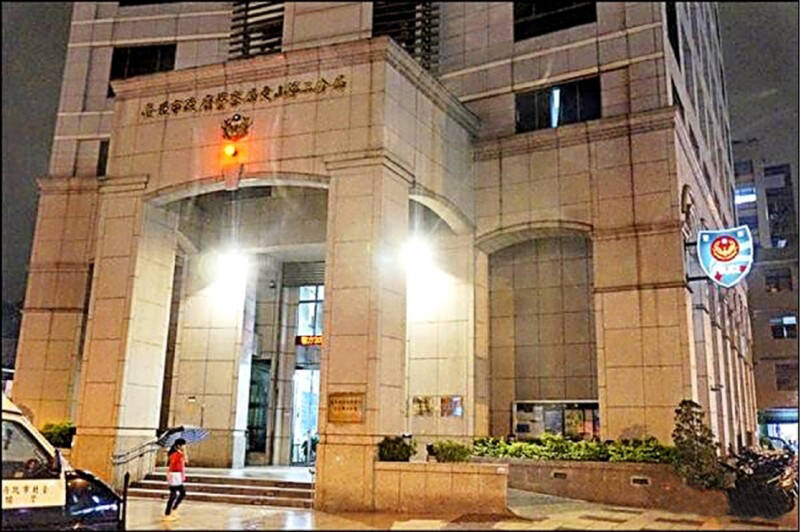Taipei police on Wednesday arrested an Uber driver and his wife for allegedly defrauding the delivery app giant and its partners of nearly NT$8.4 million (US$259,644) by using fake accounts and forging banking information.
The main suspect, a 27-year-old man surnamed Chen (陳), was accused of engaging in two schemes following his employment as an Uber driver in 2019, a spokesperson of Taipei Police Department’s Wenshan Second Precinct said.
Chen allegedly created fake user accounts, which he utilized to make and then cancel orders from six phony restaurants he also created.

Photo: Taipei Times file
As the fake accounts used cash as the default payment option, Uber would compensate Chen’s restaurants for supposed monetary losses, police said, adding that the suspect deactivated the user accounts before the app could charge them.
Chen allegedly made NT$5.7 million before being detected, police said.
In 2021, Chen reapplied to work as an Uber sales coordinator and made use of his position to allegedly divert payments worth NT$2.67 million from legitimate restaurants to his private bank accounts, they said.
Uber detected the irregularity due to the crudity of Chen’s more recent scheme and froze his account before calling police, police said, adding that the suspect had fled to Taichung by that time.
Investigators tracked Chen via his IP address and bank accounts, they said.
Chen and his wife, who helped set up some of the fake restaurants, were arrested and questioned prior to being transferred to the Taipei District Prosecutors’ Office on recommended charges related to forgery, fraud and tampering with computer data, police said.
Uber said the app has been upgraded since Chen’s actions, and its partners should rest assured that transactions on the platform are safe.
Separately, the Changhua District Court handed down a guilty verdict for another couple in connection to a receipt mill scam that cheated NT$3.73 million out of the uniform invoice lottery.
The husband-and-wife duo, also surnamed Chen (陳), were coconspirators of a man surnamed Tseng (曾), who allegedly founded seven shell corporations passing as companies specializing in water treatment, the court said.
Tseng apparently used these companies as receipt mills that churned out invoices on an industrial scale, court documents said.
In November 2016, the Chens started to work for Tseng and the couple’s job consisted entirely of printing invoices for payments for goods and services worth NT$1 to NT$3, the court said.
The husband printed 65 winning invoices worth NT$13,000 in the first month, 569 winning invoices worth NT$140,000 in the following month, and 2,096 invoices worth close to NT$430,000 in his best month, it said.
Tseng cashed the receipts via intermediaries, including several people who habitually collected the winnings from the same convenience store, arousing suspicion from its owner, the court said.
Changhua prosecutors opened an investigation into the suspicious receipts and issued indictments for Tseng and his coconspirators, it said.
The judge assigned to the case sentenced the husband to two years and six months in prison and his wife to two years in prison, in addition to five years of deferred jail time, the court said.
The judgement was relatively lenient on account of the couple’s quick confession to the crime, willingness to pay back the government and having three children, it said.

Taiwanese can file complaints with the Tourism Administration to report travel agencies if their activities caused termination of a person’s citizenship, Mainland Affairs Council Minister Chiu Chui-cheng (邱垂正) said yesterday, after a podcaster highlighted a case in which a person’s citizenship was canceled for receiving a single-use Chinese passport to enter Russia. The council is aware of incidents in which people who signed up through Chinese travel agencies for tours of Russia were told they could obtain Russian visas and fast-track border clearance, Chiu told reporters on the sidelines of an event in Taipei. However, the travel agencies actually applied

Japanese footwear brand Onitsuka Tiger today issued a public apology and said it has suspended an employee amid allegations that the staff member discriminated against a Vietnamese customer at its Taipei 101 store. Posting on the social media platform Threads yesterday, a user said that an employee at the store said that “those shoes are very expensive” when her friend, who is a migrant worker from Vietnam, asked for assistance. The employee then ignored her until she asked again, to which she replied: "We don't have a size 37." The post had amassed nearly 26,000 likes and 916 comments as of this

New measures aimed at making Taiwan more attractive to foreign professionals came into effect this month, the National Development Council said yesterday. Among the changes, international students at Taiwanese universities would be able to work in Taiwan without a work permit in the two years after they graduate, explainer materials provided by the council said. In addition, foreign nationals who graduated from one of the world’s top 200 universities within the past five years can also apply for a two-year open work permit. Previously, those graduates would have needed to apply for a work permit using point-based criteria or have a Taiwanese company

The Shilin District Prosecutors’ Office yesterday indicted two Taiwanese and issued a wanted notice for Pete Liu (劉作虎), founder of Shenzhen-based smartphone manufacturer OnePlus Technology Co (萬普拉斯科技), for allegedly contravening the Act Governing Relations Between the People of the Taiwan Area and the Mainland Area (臺灣地區與大陸地區人民關係條例) by poaching 70 engineers in Taiwan. Liu allegedly traveled to Taiwan at the end of 2014 and met with a Taiwanese man surnamed Lin (林) to discuss establishing a mobile software research and development (R&D) team in Taiwan, prosecutors said. Without approval from the government, Lin, following Liu’s instructions, recruited more than 70 software